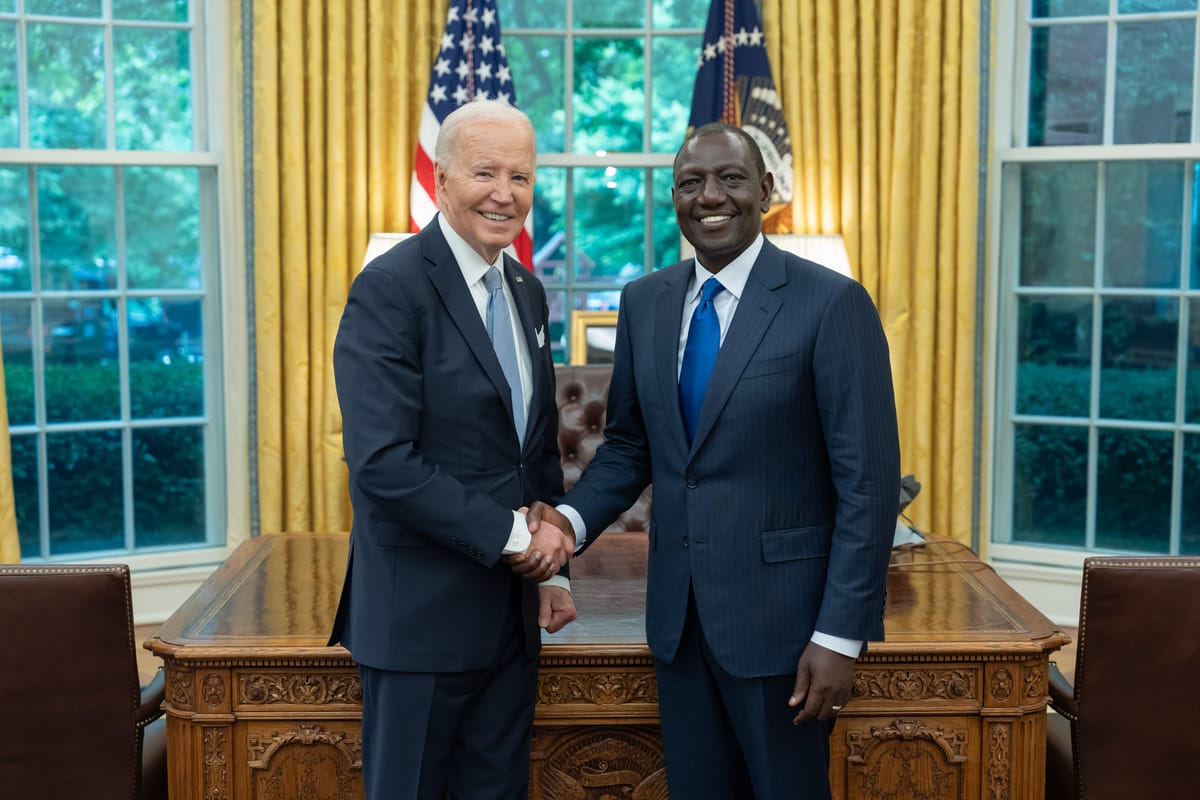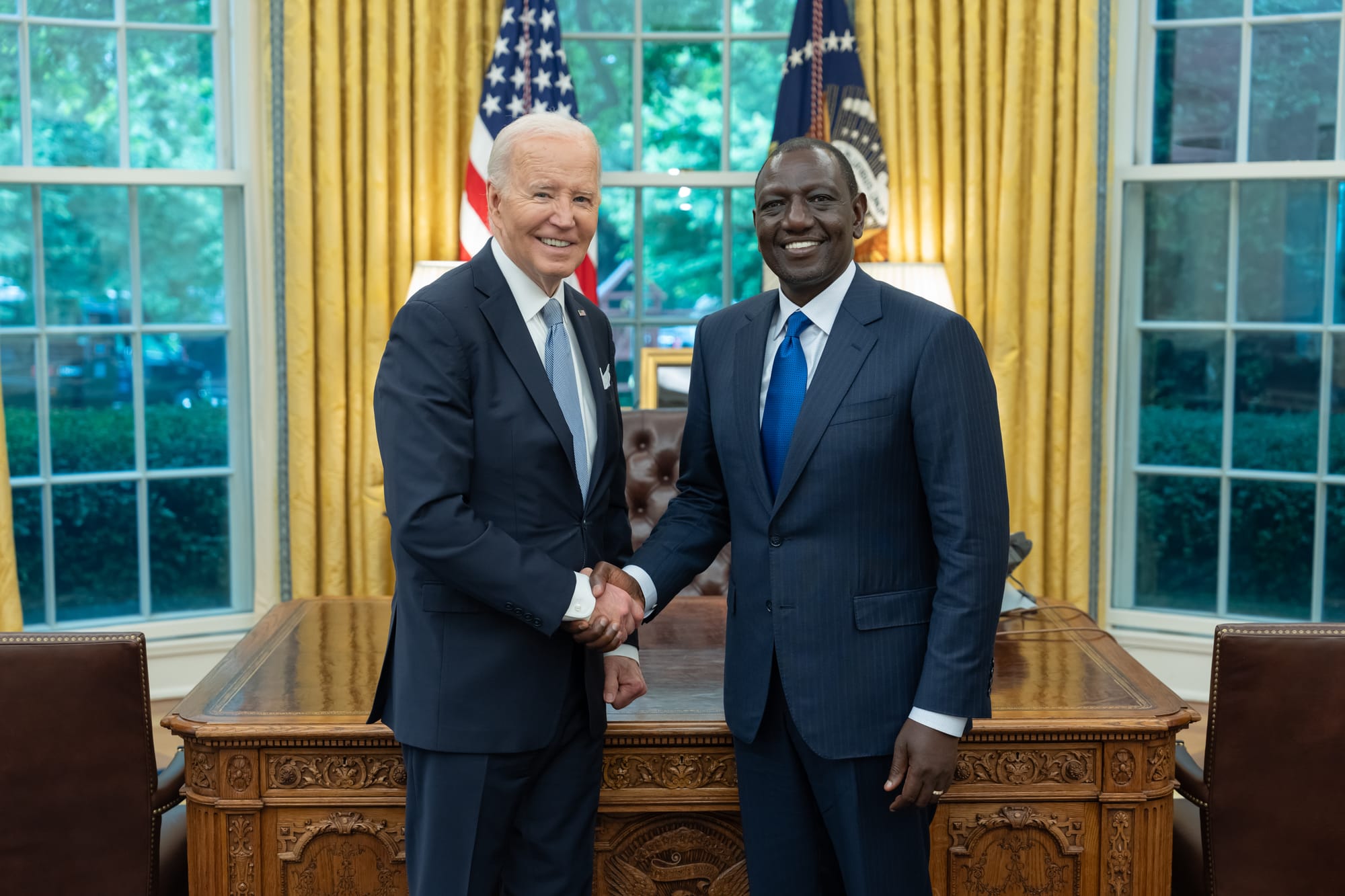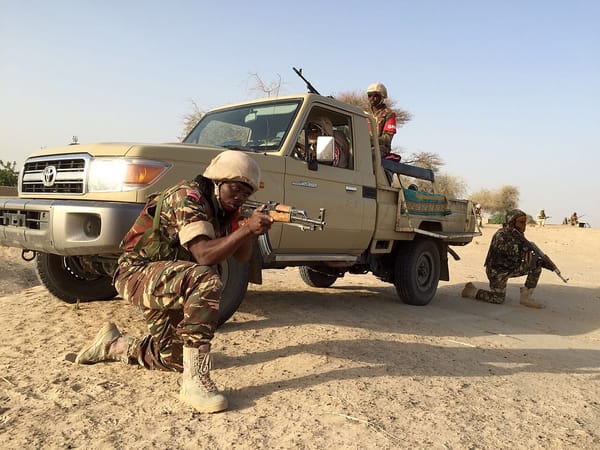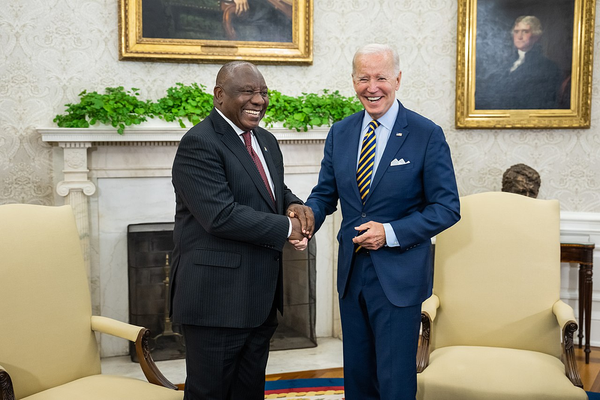News From Around The Motherland.
In this week's post, we look at the latest news about the Jihadist attack in Mali and its potential impact on West Africa. The extradition of Michael Lomas to South Africa to answer for energy sector-related corruption charges. And the return of American forces to Chad.

Hi there! Here are the top African news making headlines from week 37 of the year 2024
- Jihadists Attacked Mali’s International Airport.
- British Businessman Extradited To South Africa To Face Energy Sector Corruption Charges.
- President Cyril Ramaphosa Signs Controversial The Basic Education Laws Amendment (BELA) Bill Into Law
- United States Military To Return To Chad Following 'Partnership-Centric' Agreement
- $90 Billion Electricity Fund Backed By The World Bank And The African Development Bank launched.
HEADLINE NEWS
Nigeria.
More Flood Warning Issued For 11 of 36 Nigerian States.
Video generated in hailuoai
Nigeria's government has issued a warning about potential flooding in 11 states due to the gradual release of water from the Lagdo dam in Cameroon. The Nigerian hydrological agency reassured the public that there was no cause for alarm, but the situation remains concerning given the severe floods that have already impacted northeastern Nigeria, affecting over 400,000 people.
In Borno state, flooding has displaced residents, with recent incidents leading to the deaths of 30 people following the collapse of a major dam. The humanitarian crisis has worsened, compounding the challenges faced by millions displaced by ongoing violence in the northern region. This year, West Africa has experienced unprecedented flooding, affecting more than 2 million people, significantly higher than previous years.
Mali.
Jihadists Attacked Mali’s International Airport.
On Tuesday, jihadists attacked Mali’s international airport outside the capital, Bamako, raising the al-Qaeda flag and setting fire to the presidential jet. The attackers roamed the airport grounds, targeting planes and filming the assault, highlighting the vulnerability of what should be a highly secured site. The militants also struck a gendarmerie training centre in the Faladié suburb, with explosions and gunfire breaking the early morning calm. Though the government has not confirmed the death toll, reports suggest that between 60 to 100 people were killed, including trainee gendarmes, with more than 200 wounded.
This attack underscores the deteriorating security situation in Mali, despite efforts by the junta to bolster defence capabilities, including enlisting Russian mercenaries from the Wagner Group. Jihadist activity has increasingly spread from northern and central Mali to regions further south, testing the junta's control. While the militants were eventually repelled, the assault serves as a grim reminder of the ongoing insurgency that continues to destabilize Mali and its neighbours. With the rise of ethnic tensions and widespread reprisals against the Peul community, the nation remains deeply entrenched in conflict.
South Africa.
British Businessman Extradited To South Africa To Face Energy Sector Corruption Charges.

Michael Lomas, a British businessman and former contractor for South Africa's troubled power utility Eskom, has been extradited from the UK to face 65 counts of corruption. Lomas is accused of accepting kickbacks on contracts worth over 1.4 billion rand ($80 million) between his company, Tubular Construction, and Eskom for work at the Kusile power station. He was arrested and released on bail before fleeing to the UK. Lomas arrived in Johannesburg on Friday and was escorted under heavy police security due to his poor health.
The National Prosecuting Authority (NPA) had sought Michael Lomas's extradition from the UK since 2022, but the process was delayed by his numerous court appeals. Now in South Africa, Lomas will face charges alongside 11 co-accused, including senior Eskom executives. The charges, involving fraud, money laundering, and corruption, relate to inflating costs and accepting bribes on contracts for the Kusile power station project. This project, designed to alleviate South Africa’s power crisis, has been riddled with delays and mismanagement. The Hawks, a specialized unit of South Africa’s police force, have been investigating these allegations since 2017.
Kenya.
President W. Ruto Prises Kenyan Police Performace In Haiti Despite Contrary U.N. Analysts Assertion.

Kenyan President William Ruto arrived in Haiti on Saturday, asserting that the Kenyan police force's deployment has significantly improved the country's security situation. He made this claim while meeting with Kenyan police officers stationed at a base in Haiti, alongside high-ranking Haitian and Canadian officials. Ruto's remarks followed his visit to assess the progress of the Kenyan forces, who were deployed in June to combat gang violence. However, his statement contrasts with a United Nations security expert's recent warning that gang violence is worsening, with many Haitians saying that security remains as poor, if not worse than before the deployment.
Kenya was the first country to send police forces to Haiti as part of a U.N.-led international effort to stabilize the nation, which has descended into chaos since the 2021 assassination of President Jovenel Moïse. About 400 Kenyan police officers are currently deployed, with Jamaica recently contributing additional forces. Despite these efforts, U.S. and other international officials have expressed concerns that the number of deployed forces and available resources are insufficient to combat the gangs, which now control approximately 80% of Haiti’s capital, Port-au-Prince.
South Africa
President Cyril Ramaphosa Signs Controversial The Basic Education Laws Amendment (BELA) Bill Into Law

President Cyril Ramaphosa has signed the Basic Education Laws Amendment (BELA) Bill into law, aiming to enhance governance in South Africa's education sector. During the signing at the Union Buildings, he acknowledged ongoing challenges, such as language policies and school fees, that hinder access to education despite progress made since the end of apartheid. The Bill includes provisions for compulsory Grade R, improved school admissions for vulnerable learners, and stronger accountability for parents and schools.
To foster inclusivity, the law addresses language policies and promotes respect for cultural beliefs in school codes of conduct. While the implementation of certain clauses has been delayed by three months for further consultation, Ramaphosa emphasized the importance of cooperation among government, school governing bodies, and parents to ensure quality education for all children.
South Africa
Snow Storm Hit the KwaZulu-Natal Province Of South Africa.
In response to the South African Weather Service's forecast of severe snow and wet conditions, CoGTA Minister Velenkosini Hlabisa has directed the National Disaster Management Centre to coordinate readiness and response efforts with relevant stakeholders. The extreme cold, particularly affecting KwaZulu-Natal and the Free State, has prompted a multisectoral response focused on humanitarian relief, including shelter for those stranded.
The South African National Defence Force will lead rescue operations, while the Department of Transport handles road clearance. Hlabisa emphasized the priority of saving lives and advised against travel during these conditions. Disaster response structures have been activated across affected provinces, with ongoing efforts to restore essential services disrupted by heavy snowfall and rain. Residents are urged to stay alert, heed warnings, and contact local authorities for emergencies.
Chad
United States Military To Return To Chad Following 'Partnership-Centric' Agreement

The U.S. military has reached an agreement with Chadian authorities to return American special forces to Chad, following their withdrawal before the May presidential election. General Kenneth Ekman announced that the decision was made by Nigerien President Mahamat Deby.
Marine Corps General Michael Langley, head of AFRICOM, stated that the U.S. approach in Africa will remain "partnership-centric" and focused on learning from African nations' counter-terrorism strategies. As global powers like Russia and China increase their ties with Africa, the region's geopolitical significance is rising. Langley emphasized that U.S. relations with African partners are built on mutual respect, avoiding ultimatums regarding security choices.
Rwanda
Rwanda Begins Mpox Vaccination Using Doses Donated By Nigeria Amid Calls For More Doses.
Rwanda has initiated a vaccination campaign against mpox, using 1,000 doses donated by Nigeria from a larger supply received from the U.S. This effort targets high-risk populations in seven districts near the Democratic Republic of Congo, which is facing a significant outbreak with 2,912 new cases and 14 deaths reported in just one week.
As the Africa CDC stresses the urgency of controlling the outbreak, countries may need around 10 million doses to respond effectively. Meanwhile, Japan has pledged 3 million doses to Congo, which plans to start its vaccination campaign in October. The WHO has authorized a vaccine from Bavarian Nordic A/S, allowing organizations like Gavi and UNICEF to make purchases, though supply remains constrained due to limited manufacturing.
Morocco
Moroccan Authorities Fend Off Groups Of Young Moroccans Attempting To Cross Into Spain.
Riot police were deployed on the Moroccan side of the border with Spain’s Ceuta enclave as tensions flared for the third consecutive night, following social media calls for mass migration attempts. Moroccan authorities reported that groups of mainly young Moroccans attempted to cross into Spain, leading to confrontations where police used water cannons, and individuals retaliated by throwing stones. In response to the unrest, Moroccan intelligence arrested 60 people suspected of inciting the migration attempts.
On Monday, nine young people trying to swim to Ceuta were intercepted by Moroccan forces before reaching the beach. Ceuta and Melilla have long been hotspots for migrants seeking entry into Europe, with many individuals from Morocco and sub-Saharan Africa fleeing war and economic uncertainty gathering at the border. The Spanish Interior Ministry stated that coordinated security efforts have managed to bring the situation under control. Moroccan authorities also reported halting over 45,000 migration attempts from January to early September, with significant numbers in August alone.
Zimbabwe.
The Reserve Bank of Zimbabwe Continues To Battle New Currency Depreciation. Blames Speculative Behaviour.

The Reserve Bank of Zimbabwe (RBZ) injected US$64 million into the Interbank Market in September to combat the depreciation of the ZWG currency, which has been impacted by rising parallel market exchange rates. Launched on April 5, 2024, the local currency initially stabilized but has since fallen, now trading at rates exceeding US$1:ZWG20. The government blames speculative behaviour in the informal economy, however, analysts highlight the limited availability of foreign currency on the official market as a key factor driving companies to the parallel market.
In response to this economic situation, RBZ Governor John Mushayavanhu announced a significant foreign currency injection: US$24 million in the first two weeks of September and an additional US$40 million later in the month. This initiative aims to stabilize the currency and ensure that foreign currency applications are met. Analysts urge the government to improve access mechanisms for companies to obtain foreign currency, emphasizing the importance of the US dollar for operations. Without effective access, parallel market rates will likely continue to rise, complicating the economic landscape further.
South Sudan
South Sudan Oil Export Through Troubled Sudan To Resume Following Agreement.
South Sudan’s President Salva Kiir has reached an agreement with Sudan's de facto leader, Gen Abdel Fattah al-Burhan, to resume vital oil exports from South Sudan through Sudan. The ongoing civil war in Sudan has severely disrupted South Sudan's oil industry, which is crucial for its economy. Repairing the damaged infrastructure will take about four months, but the situation remains uncertain due to the control of key areas by the paramilitary Rapid Support Forces.
During talks in Juba, both leaders emphasized enhancing regional peace and stability through dialogue. South Sudan’s Foreign Minister, Ramadan Abdalla Goc, noted that Sudanese engineers have completed the necessary preparations for resuming oil production. Engineers from South Sudan are expected to visit Sudan soon to assess the facilities. Additionally, the leaders agreed to reopen humanitarian corridors to facilitate aid delivery to Sudan amid the ongoing crisis.
WORLD HEADLINES.
Ghanaian Men Lured Into Joining The Russian Military To Fight In Ukraine.
The situation involving the 14 Ghanaian men lured into joining the Russian military to fight in Ukraine reflects Russia's desperate attempts to bolster its forces by recruiting foreign nationals by deceit. These men promised well-paying jobs and forced into military service after being taken to Kostroma, now find themselves trapped in Russian-occupied Donetsk Oblast. Only a few survivors from the group have managed to speak out, claiming to be held against their will, while the whereabouts of others remain unknown.
This disturbing case highlights a broader pattern of exploitation, with reports of similar coercion targeting nationals from countries like India, Cuba, Egypt, and Nepal. Recruitment schemes have pressured migrants and students into fighting by threatening them with visa revocations. While international intervention has secured some releases, such as the case of 45 Indian nationals, efforts to combat these smuggling operations remain ongoing. The families of the Ghanaian men have appealed to their government for help in securing their safe return.
Puff Daddy Denied Bail A Second Time Following Racketeering And Sex Trafficking Charges.

U.S. District Judge Andrew L. Carter ruled against releasing Combs on bail, rejecting a $50 million offer with GPS monitoring and visitor restrictions, deeming it insufficient to protect the community and prevent witness tampering. Carter agreed with prosecutors that no conditions could adequately mitigate the risks associated with Combs' release, given the nature of the charges against him.
Combs, who pleaded not guilty to charges of physically and sexually abusing women for years, has been held in Brooklyn's Metropolitan Detention Center. His legal team had proposed home detention at his luxurious Florida residence, but the judge, like Federal Magistrate Robyn F. Tarnofsky before, found him too dangerous for release. Combs faces allegations of orchestrating drugged sexual performances, coercion, and violent acts to silence his victims.
The United Nations Urge Deescalation As Lebanon Reel From Israeli Retaliatory Airstrike On The Heels Of The Exploding Pagers Attack.

Lebanon's health minister announced Saturday that the death toll from an Israeli airstrike on a Beirut suburb has risen to 36, including seven women and three children. The strike, which occurred during rush hour on Friday, also wounded 68 people, 15 of whom remain hospitalized. This was the deadliest Israeli airstrike on Beirut since the 2006 Israel-Hezbollah war.
Among the victims was Ibrahim Akil, a Hezbollah commander responsible for the group’s elite Radwan Forces, along with about a dozen other Hezbollah members who were meeting in the basement of the destroyed building. The airstrike followed Hezbollah's intense bombardment of northern Israel, targeting Israeli military sites. Israel's Iron Dome intercepted most of the rockets launched.
Beirut residents are alarmed after recent attacks involving exploding pagers and walkie-talkies that killed 20 and injured over 450. Many are seeking advice on hiding their devices due to fears of monitoring. Safety concerns have negatively impacted sales at local shops, as the attacks, believed to target Hezbollah by Israel, heighten fears of escalating conflict.
$90 Billion Electricity Fund Backed By The World Bank And The African Development Bank launched.
Nigeria and other African countries are set to benefit from a $90 billion electricity fund backed by the World Bank and the African Development Bank. This initiative, part of the Mission 300 program, aims to provide electricity to 300 million Africans by 2023. As part of this effort, leading climate organizations have launched a new technical assistance facility to assess and support projects that meet the program's criteria.
The funding will come from various sources, including public funds, concessional and philanthropic finance, and commercial commitments. Nigeria, a key participant in Mission 300, will benefit through the Nigeria Distributed Access through Renewable Energy Scale-up (DARES) project, which aims to improve electricity access for over 17.5 million Nigerians. The project also seeks to replace over 250,000 polluting diesel generators with clean energy solutions.
African Personality Of The Week
Aliko Dangote

Aliko Dangote, born on April 10, 1957, is a prominent Nigerian businessman and industrialist. As the founder, chairman, and CEO of the Dangote Group, West Africa's largest industrial conglomerate, he has made significant strides in transforming the region's industrial landscape. One of his landmark achievements is building Nigeria's first privately-owned refinery. In August 2024, the Bloomberg Billionaires Index estimated his net worth at $13.4 billion, ranking him as the second richest Black person and the 158th wealthiest individual globally.
Dangote is our Personality of the Week for his pivotal role in addressing Nigeria’s longstanding issue of petroleum scarcity. Despite being a major crude oil producer, Nigeria has struggled for decades to maintain its refineries and ensure a stable supply of petroleum products, hindering economic growth. Through his refinery, Dangote has started distributing refined petroleum products in Nigeria, potentially changing the course of the nation's energy sector and driving much-needed development.
We invite you to explore sponsorship opportunities or get in touch with us. Reaching out to admin@prominentgreen.com.
Your engagement is highly valued, and we look forward to hearing from you with enthusiasm!

Thank you for reading.
Unlock a world of knowledge and stay ahead of the curve by subscribing to our engaging weekly newsletter.
If this was forwarded to you, don't miss out on the latest and most important headlines in Africa. Subscribe now, share your thoughts in the comments, and spread the knowledge




